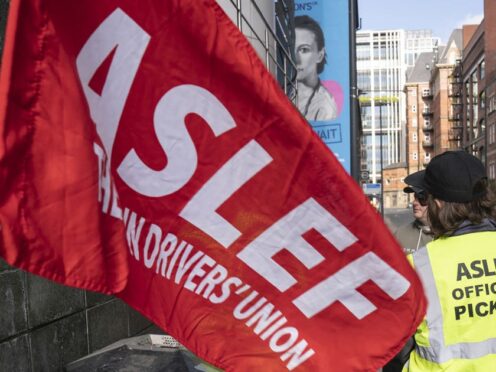Train drivers at 16 rail companies are to stage a fresh series of strikes in their long-running pay dispute, disrupting travel in the week of the May bank holiday.
Members of Aslef will walk out on May 7, 8 and 9 at different operators and ban overtime for six days from May 6.
The union said it has not met employers or the Government for more than a year, accusing ministers of “giving up” trying to resolve the near two-year dispute.
NEW: Strike action announced for 7 – 9 Mayhttps://t.co/hkye2YO4uE
— ASLEF (@ASLEFunion) April 22, 2024
Drivers will strike on May 7 at c2c, Greater Anglia, GTR Great Northern Thameslink, Southeastern, Southern, Gatwick Express and South Western Railway.
On May 8 there will be strikes at Avanti West Coast, Chiltern Railways, CrossCountry, East Midlands Railway, Great Western Railway and West Midlands Trains.
Aslef members at LNER, Northern Trains and TransPennine Express will strike on May 9.
Aslef said train drivers have not had an increase in salary for five years, since their last pay deals expired in 2019.
The union said that after its members voted overwhelmingly in February to continue taking industrial action, it asked the train operating companies to hold talks.
General secretary Mick Whelan said: “It is now a year since we sat in a room with the train companies and a year since we rejected the risible offer they made and which they admitted, privately, was designed to be rejected.
“We first balloted for industrial action in June 2022, after three years without a pay rise. It took eight one-day strikes to persuade the train operating companies (Tocs) to come to the table and talk.
“Our negotiating team met the Rail Delivery Group (RDG) on eight occasions – the last being on Wednesday April 26 last year.
“That was followed by the Tocs’ ‘land grab’ for all our terms and conditions on Thursday April 27 – which was immediately rejected.
“Since then train drivers have voted, again and again, to take action to get a pay rise.
“That’s why Mark Harper, the Transport Secretary, is being disingenuous when he says that offer should have been put to members. Drivers would not vote to strike if they thought an offer was acceptable.”
Mr Whelan said the year-old offer of a 4% pay rise followed by a second 4% increase is “dead in the water”.
A spokesman for the Rail Delivery Group said: “This wholly unnecessary strike action called by the Aslef leadership will sadly disrupt customers and businesses once again, while further damaging the railway at a time when taxpayers are continuing to contribute an extra £54 million a week just to keep services running.
“We continue to seek a fair agreement with the Aslef leadership which both rewards our people, gives our customers more reliable services and makes sure the railway isn’t taking more than its fair share from taxpayers.”
A Department for Transport spokesperson said: “Aslef’s leadership are acting like a broken record – calling for strike action time and time again while remaining the only rail union continuing to strike, as well as the only union refusing to put a fair and reasonable pay offer to its members for over a year.
“The Transport Secretary and rail minister have done their part to facilitate this pay offer, – one which would take train drivers’ salaries up to an average of £65,000 which is almost twice the average salary in the UK.
“Aslef bosses should take the lead of the other rail unions, put this offer to their members and stop their campaign of contempt for passengers.”
